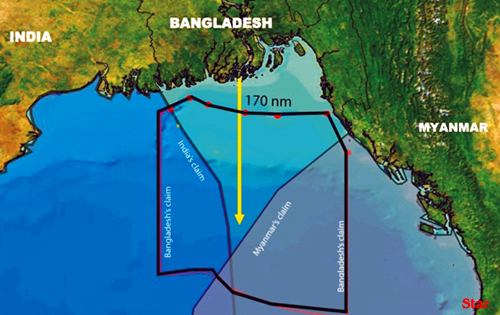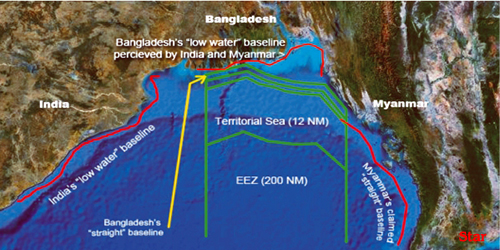Chittagong, Bangladesh: Foreign Minister Dipu Moni leaves for Hamburg today to present Bangladesh’s case concerning delimitation of the maritime boundary with Myanmar, reported UNB.

The hearing that began on September 5 at the International Tribunal for Law of the Sea (ITLOS) in Hamburg will continue until Sept 22.
The foreign minister will present Bangladesh’s views on equitable sharing of Exclusive Economic Zone (EEZ) and Continental Shelf in the Bay of Bengal against Burma’s method of equidistance.
Additional Foreign Secretary (UNCLOS) Rear Admiral (retd) Khurshid Alam, who will accompany the foreign minister, told that closing hearing on Bangladesh’s arguments will be held on September 21-22.
He expects that the ITLOS would give its judgment in the case in March-April next year.
Earlier, the foreign minister presented Bangladesh’s claim on the continental shelf at the UN Commission on the Limits of the Continental Shelf (CLCS) at the UN Head¬quarters in New York on August 24.
Bangladesh put up its claim under the provisions of Article 76 of the UNCLOS 1982.
Bangladesh's claim on the continental shelf extends from 390 to 460 nautical miles (850 km) southwards from its coastline.
Dhaka submitted its claim to the CLCS on February 25 this year, four months ahead of the deadline.
“The recent push to delimit the maritime boundary between Bangladesh and Myanmar stems from two factors. First, there are strong prospects for newly accessible gas in the overlapping claims. Speculation about gas prospects results from advances in offshore drilling technologies that allow exploration in new swathes of the geologically promising but disputed ocean. Second, there is heightened demand for natural gas by the two countries. The growing demand for natural gas in Bangladesh, which has experienced power shortages, constitutes a major domestic political issue. Demand for gas has also grown rapidly in potential export markets, creating strong incentives for Myanmar to export gas in order to bring in foreign reserves and gain favor with countries such as China and India,” according to a report of The National Bureau of Asian Research’s website.

On the 1st of November, 2008 four drilling ships from Burma started exploration for oil and gas reserves within 50 nautical miles south west of St. Martins Island, in Bangladesh. A South Korean company was awarded the oil and gas exploration contract in that place and two Burmese naval ships escorted the drilling ships. Three naval ships of Bangladesh went to challenge them but the Burmese Navy responded by alleging that the Bangladesh Navy ships are trespassing.
This escalated the maritime boundary disputes between Bangladesh and Burma. Burma vowed to continue with the exploration despite the territorial dispute with Bangladesh. Bangladesh Government warned the Burmese envoy in Bangladesh to immediately suspend all activities within the declared maritime zones of Bangladesh in accordance with the Territorial Waters and Maritime Zones Act 1974 of Bangladesh and sent a high level delegation to Burma.
In the end, Bangladesh had to request an UN intervention. Bangladesh has already lodged a complaint against Burma at the UN, and in response, the International Tribunal for the Law of the Sea (ITLOS) has initiated the arbitration process.



